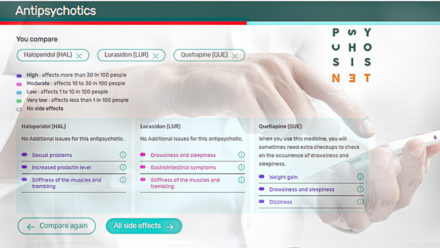
Psychiatrists are being taught during their training to look at patients with a ‘clinical view’. This may include observing the patient. In case a patient talks quickly and continuously without taking a break this may indicate mania. Voices in the head of the patient showing outwardly may be caused by residual psychotic symptoms. By observing too much, however, the genuine contact between psychiatrist and patient can be lost.
In this blog, May-May Meijer argues in conversation with Jim van Os for the importance of genuine contact between psychiatrist and patient.
May-May: “It is better if a psychiatrist mentions what he/she notices in the conversation, for example if he notices that the patient talks quickly and continuously. Or perhaps no clinical view at all?
Sincere contact
When I was forced into a psychiatric hospital with severe psychosis, I experienced a barrier between the psychiatrist and me. That barrier was mainly caused by the fact that I thought that the AIVD (General Intelligence and Security Service) did not allow me to talk to the doctors, but also because of the clinical view of said doctors. I felt that they were not really paying attention to my story, on the contrary, I felt that I was being ‘observed’. I felt like they were actually doing something else and not really paying attention as I revealed my fears to them.
Empathy
I found it – when I was psychotic – very frightening that I was continuously being monitored by the AIVD. Psychiatrists asked me: and are you still thinking about the AIVD? It seemed they did not realize how scary that might have been for me. Furthermore, I often had the idea that I was being poisoned when I drank water or tea, but this did not come up in conversations with the psychiatrists (guess it felt not safe to bring it up), the result was that I endured very anxious moments alone and in isolation.
Why do you think the AIVD does not allow you to talk?
A young doctor in training did have empathy. She asked me when I was psychotic: ‘Why do you think the AIVD doesn’t allow you to talk’? That almost persuaded me to talk about my psychosis. Unfortunately I was already too far into my psychosis at the time to do so. Nevertheless, for me it was and still is a successful example of making genuine contact.
What do you think Jim? What about that ‘clinical look’ of yours?”
Answer Jim van Os
“Hey May-May,
I think you are raising a very important topic. If you have a head full of psychiatric knowledge about diseases and symptoms, then you start looking at the world around you through the lense of that knowledge; If you are not careful, you become so absorbed in it that the person opposite you – say the patient – realizes that you are not trying to enter into a conversation with him/her as a person, but that you are more engaged in conducting technical research studying whether the patient meets certain diagnostic criteria.
It’s a subtle process that you describe very accurately . It comes at the expense of the quality of the human encounter that should actually be there. People feel that they are being viewed as lab animals and will therefore be inclined not to tell you things as opposed to sharing their feelings with you.
Does this happen often?
The answer is unfortunately: Yes. Study after study shows that psychiatrists (and doctors in general) tend to view the world through the lens of disease, while patients perceive the world on the level of experience and its impact on what they think is the reality that makes life meaningful. Addressing psychosis as a source of human concern, as a metaphor for general human emotions, does not always seem obvious to psychiatrists. ‘Talking to the psychosis’ is not something that one naturally learns during the training. Looking through the lens of (brain) diseases is.
Is this important?
Yes! Because everything in psychiatry is in fact about helping people with change and acceptance processes, something that they do not always feel like to do or have the opportunity to do. Assisting people in these kinds of processes is crucially dependent on the quality of the emotional relationship. And that emotional relationship doesn’t come about if the person in front of you makes you feel like you’re being watched and examined like some kind of guinea pig.
What can be done about this?
One would say that it should be easy for the psychiatrist to descend from the mountain of knowledge in order to meet the other person openly and without prejudice. But in practice it is not so easy. It is about a process of what is called ‘cognitive debiasing’ – the process of learning to look from scratch with wonder at the other person in front of you. In the training of ‘Open Dialogue‘, for example, care providers are really taught to take off the professional armour in order to engage with the other as a vulnerable fellow human being. Hard work!
So, May-May:
As far as I am concerned, this is a very important subject, not only for psychiatry but for the whole world of professional care. Psychiatry is about the encounter between two vulnerable people, one slightly more vulnerable than the other.”

May-May Meijer is chairman of Peace SOS. She was Sectioned for six months in 2009. May-May is the author of the book Inner Voices.
May-May also wrote a couple of first person accounts for Schizophrenia Bulletin





Comments: